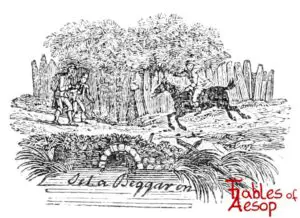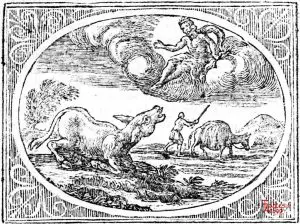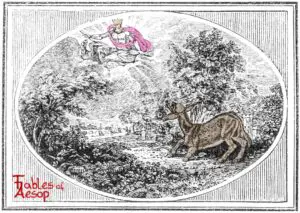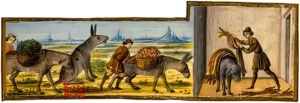An Ass worked under many masters, each worked him harder than the last. He decried ever leaving the first as the last was a tanner who will take his hide.
Tis madness and folly to appeal to providence and nature.

Townsend version
An ass, belonging to an herb-seller who gave him too little food and too much work made a petition to Jupiter to be released from his present service and provided with another master. Jupiter, after warning him that he would repent his request, caused him to be sold to a tile-maker. Shortly afterwards, finding that he had heavier loads to carry and harder work in the brick-field, he petitioned for another change of master. Jupiter, telling him that it would be the last time that he could grant his request, ordained that he be sold to a tanner. The Ass found that he had fallen into worse hands, and noting his master’s occupation, said, groaning: “It would have been better for me to have been either starved by the one, or to have been overworked by the other of my former masters, than to have been bought by my present owner, who will even after I am dead tan my hide, and make me useful to him.”

Samuel Croxall (Jupiter and the Ass)
A CERTAIN Ass, which belonged to a gardener, and was weary of carrying his heavy burthens, prayed to Jupiter to give him a new master. Jupiter, consenting to his petition, gave him a tile-maker, who loaded him with tiles, and made him carry heavier burthens than before. Again he came, and made supplications, beseeching the God to give him one that was more mild; or, at least, to let him have any other master but this. Jupiter could not chuse but laugh at his folly; however, he granted his request this time also, and made him over to a tanner. But, as soon as the poor Ass was sensible what a master he had got, he could not forbear upbraiding himself with his great folly and inconstancy, which had brought him to a master not only more cruel and exacting than any a the former, but one that would not spare his very hide after he was dead.
THE APPLICATION
This fable is a lively representation of the instability of mankind, who are seldom or never contented with their own lot, But whatever men may think, it is a thousand to one but they know less of any other way, than of that in which they have been bred: and if Providence should comply with their humorous request, in such a case, they Would probably find themselves more at a loss, and more uneasy in their new station of life, than ever they were in the old; at least, there is great reason to suppose they would. The vanity and ignorance of the men of this world are so great, that if every man might be what he desired, few would be what they ought. So that it is not of less importance to the good of the public in general, than our own particular quiet and happiness, that every man should be easy and contented with the condition which Providence and his education have allotted him.

Thomas Bewick (Jupiter and The Ass)
An Ass which had been some time in the service of a Gardener, and carried his vegetables to market, became tired of his place, and petitioned Jupiter that he would permit him to enter upon the service of a neighbouring Potter. Jupiter granted his request. He here, however, soon found that the latter loaded him with heavier burthens, and kept him on poorer fare than he had been used to before. He again prayed to Jupiter to grant that he might be allowed to better his condition by engaging himself to a Tanner. Jupiter again heard his prayer; but here he soon found he had changed for the worse: for, besides being hard worked, he was also often cruelly treated; and seeing what was going on in this place, he could not forbear upbraiding himself with his folly and inconstancy. Oh, fool that I was! said he to himself, for leaving my former mild master, to become the servant of one, who, after working me to death, will not spare my very hide after I am dead.
APPLICATION.
The man that carries about with him the plague of a restless mind, can never be pleased; he is ever shifting and changing, and is in truth not so weary of his condition as of himself. Seldom or never contented with his lot, he is ever hunting after happiness where it is not to be found, without ever looking for it where it is. He indulges in the strange propensity of his nature, which leads him to suppose that his own lot is the most miserable, and therefore concludes that any change he can make must be for the better. He loses sight of the virtues of patience, constancy, and resignation, and seems not to know that every station in life has its real or imaginary inconveniences; and that it is better to bear with those which we are accustomed to endure, and of which we know the utmost extent, than by aiming at the seeming advantages of another way of life, to subject ourselves to all its hidden miseries.


JBR Collection (Jupiter and The Ass)
A certain Ass that belonged to a gardener, was weary of carrying heavy burdens, and prayed to Jupiter to give him a new master. Jupiter granted his prayer, and gave him for a master a tile-maker, who made him carry heavier burdens than before. Again he came to Jupiter, and besought him to grant him a milder master, or at any rate, a different one. The god, laughing at his folly, thereupon made him 0ver to a tanner. The Ass was worked harder than ever, and soon upbraided himself for his stupidity. “Now,” said he, “I have a master who not only beats me living, but who will not spare my hide even when I am dead.”

Gherardo Image from 1480

Iuppiter et Olitoris Asinus
Asinus olitoris, aegre sustinens laborem quo herus eum premebat, conqueritur de eo apud Iovem; supplicat alium sibi dari. Exaudit Iuppiter; iubet figulo veneat. Mutatur herus, sed non minuitur labor; immo augescit; semper lutum, tegulae, lateres, imbrices, dorso portandae. Iterum ad Iovem; Iuppiter, oratoris importunitate victus, dat coriarium. Statim expertus eum, omnibus quos unquam habuerat longe crudeliorem, apud se lamentans dicebat, “Heu me miserum, ut omnia mihi in deterius cedunt. Nam in eum incidi dominum, qui vivo non parcit, nec mortuo; ipse enim ubi corpus meum flagris exhauserit, in fine excoriabit.”
Perry #179


